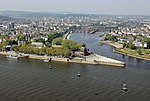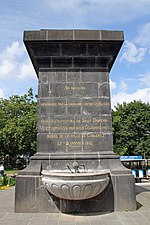The Rhine Province (German: Rheinprovinz), also known as Rhenish Prussia (Rheinpreußen) or synonymous with the Rhineland (Rheinland), was the westernmost province of the Kingdom of Prussia and the Free State of Prussia, within the German Reich, from 1822 to 1946. It was created from the provinces of the Lower Rhine and Jülich-Cleves-Berg. Its capital was Koblenz and in 1939 it had 8 million inhabitants. The Province of Hohenzollern was militarily associated with the Oberpräsident of the Rhine Province.
The Rhine Province was bounded on the north by the Netherlands, on the east by the Prussian provinces of Westphalia and Hesse-Nassau, and the grand duchy of Hesse-Darmstadt, on the southeast by the Palatinate (a district of the Kingdom of Bavaria), on the south and southwest by Lorraine, and on the west by Luxembourg, Belgium and the Netherlands.
The small exclave district of Wetzlar, wedged between the grand duchy states Hesse-Nassau and Hesse-Darmstadt was also part of the Rhine Province. The principality of Birkenfeld, on the other hand, was an enclave of the Grand Duchy of Oldenburg, a separate state of the German Empire.
In 1911, the extent of the province was 10,423 km2 (4,024 sq mi); its extreme length, from north to south, was nearly 200 km (120 mi), and its greatest breadth was just under 90 km (56 mi). It included about 200 km (120 mi) of the course of the Rhine, which formed the eastern border of the province from Bingen to Koblenz, and then flows in a north-northwesterly direction inside the province, approximately following its eastern border. It is now part of North Rhine-Westphalia, Rhineland-Palatinate, Saarland, and Hesse.











